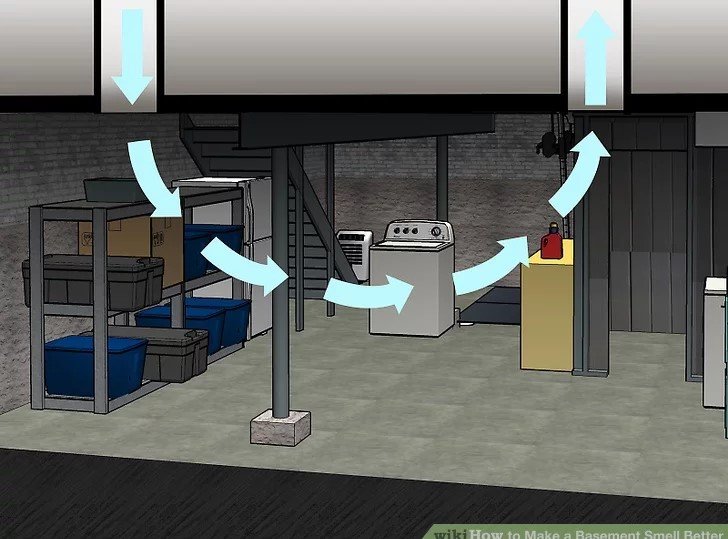A basement can often be a useful and versatile space in your home, but it can also become a source of unpleasant odours. Musty, damp smells are common issues, but with the right approach, you can transform your basement into a fresh-smelling, welcoming area. This guide will provide you with practical tips for how to make a basement smell better.
Identifying the Source of the Odour
Common Causes of Basement Smells
Before tackling the odour, it’s crucial to identify its source. Common causes include mould and mildew, standing water, dampness, and poor ventilation. Pinpointing the exact cause will help you address the issue more effectively.
Inspecting for Mould and Mildew
Mould and mildew thrive in damp, dark environments, making basements a prime location for their growth. Inspect walls, floors, and any stored items for signs of mould. Look for discolouration, musty smells, and damp spots.
Improving Ventilation
Opening Windows and Doors
Improving ventilation is one of the most effective ways to combat basement odours. If your basement has windows and doors, open them regularly to allow fresh air to circulate. This helps to disperse stale air and reduce dampness.
Using Fans and Air Purifiers
If natural ventilation is limited, use fans to improve airflow. Set up fans to provide a cross-breeze that will draw in fresh air and drive out stale air. Air purifiers with HEPA filters can also help to remove odours and improve air quality.
Controlling Humidity
Using Dehumidifiers
High humidity levels contribute significantly to basement odours. Using a dehumidifier can help to control the moisture levels, making the environment less conducive to mould and mildew growth. Regularly empty the dehumidifier and monitor humidity levels.
Regularly Checking for Water Leaks
One typical cause of moist basements is water leaks. Regularly check for leaks in pipes, walls, and floors. Leaks should be fixed right away to avoid water buildup and the accompanying smells.
Cleaning and Deodorising
Deep Cleaning the Basement
A thorough cleaning can significantly improve the smell of your basement. Start by removing any clutter and cleaning all surfaces with a mixture of water and mild detergent. Pay special attention to corners, floors, and any fabric items.
Using Natural Deodorisers
Natural deodorisers like vinegar and lemon juice can help to neutralise odours. Place bowls of vinegar or lemon juice around the basement, and let them sit for a few hours to absorb unpleasant smells.
Removing Mould and Mildew
Cleaning Mould-Infested Areas
If you discover mould or mildew, use a bleach and water solution (one cup of bleach to one gallon of water) to clean the impacted areas. Scrub the area thoroughly, then dry it completely to prevent regrowth.
Using Anti-Mould Solutions
Consider using anti-mould solutions or sprays to prevent future growth. These products can be applied to walls, floors, and other susceptible areas to create a barrier against mould and mildew.
Absorbing Odours
Using Baking Soda
Baking soda is a natural odour absorber. Place open boxes or bowls of baking soda around the basement to help absorb and neutralise unpleasant smells. Replace the baking soda every few months for continuous odour control.
Activated Charcoal
Activated charcoal is another effective odour absorber. It can be placed in bags or bowls around the basement to help eliminate smells. Activated charcoal is especially useful in areas with high humidity.
Using Air Fresheners
Commercial Air Fresheners
Commercial air fresheners can provide a quick and easy solution to basement odours. Choose products designed to neutralise odours rather than just mask them. Plug-in air fresheners or odour-eliminating sprays can be particularly effective.
DIY Air Fresheners
Moreover, you can create your air fresheners at home with organic components. A simple recipe involves mixing water, vodka, and essential oils in a spray bottle. Spritz this around the basement to add a pleasant scent and neutralise odours.
Regular Maintenance
Regular Cleaning Schedule
Maintain a regular cleaning schedule to keep your basement fresh. Dust, vacuum, and wipe down surfaces frequently to prevent odour build-up. Regular maintenance is key to a pleasant-smelling basement.
Checking for New Sources of Odour
Periodically inspect your basement for new sources of odour. Check for any signs of water damage, leaks, or mould growth. Early detection can help you address issues before they become significant problems.
Upgrading Basement Features
Improving Insulation
Improving the insulation in your basement can help to control temperature and humidity levels. Sufficient insulation keeps moisture out and lessens the chance of mould and mildew developing.
Installing a Vapour Barrier
A vapour barrier can be installed to prevent moisture from entering the basement. This is particularly useful if your basement has a history of dampness or water infiltration.
Preventative Measures
Waterproofing the Basement
Consider waterproofing your basement to prevent future dampness and odours. This might involve sealing cracks in the walls and floors, installing a sump pump, or applying a waterproof coating to the walls.
Keeping the Area Dry
Keep your basement as dry as possible. Avoid storing wet items in the basement, and use a dehumidifier regularly to control moisture levels.
Common Mistakes to Avoid
Ignoring Small Leaks
Small leaks can quickly turn into significant problems if left unaddressed. Regularly inspect for and repair any leaks to prevent water accumulation and odours.
Using Too Many Scented Products
While it might be tempting to use multiple scented products, this can sometimes make the situation worse. Too many scents can become overwhelming and may not effectively neutralise the underlying odours.
Conclusion
Making your basement smell better is entirely achievable with the right approach. By improving ventilation, controlling humidity, and using effective cleaning and deodorising methods, you can transform your basement into a fresh and pleasant space. Regular maintenance and preventative measures will ensure that your basement remains odour-free in the long term.
FAQs
How often should I clean my basement to keep it smelling fresh?
Cleaning your basement at least once a month is advised. Regular cleaning helps to prevent the build-up of odours and keeps the space fresh.
Can plants help improve the smell in my basement?
Yes, certain plants can help improve indoor air quality and reduce odours. Plants like spider plants, peace lilies, and Boston ferns are known for their air-purifying properties.
What are the signs of a serious mould problem?
Signs of a serious mould problem include persistent musty odours, visible mould growth, water stains on walls or ceilings, and an increase in allergy or respiratory symptoms.
Is it worth hiring a professional to deal with basement odours?
If you have persistent odours that you can’t eliminate with regular cleaning and maintenance, it might be worth hiring a professional. They can identify and address the underlying issues more effectively.
How can I prevent odours if my basement is unfinished?
Even in an unfinished basement, you can prevent odours by controlling humidity, improving ventilation, and regularly cleaning the space. Using dehumidifiers and placing odour absorbers like baking soda or activated charcoal can also help.



